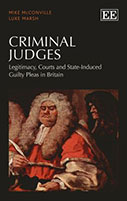Criminal Judges: Legitimacy, Courts and State-Induced Guilty Pleas in Britain

Author: Mike McConville and Luke Marsh
Publisher: Cheltenham, UK, Northampton, MA, Edward Elgar Publishing, 2014, 320p.
Reviewer: Michael Zander | November 2014
This book by two British scholars is a severe onslaught on British judges for their central role in the system of state-induced guilty pleas. The book’s rhetoric tells of the glories of the adversary system. The nasty reality, the authors say, is that most defendants, including an unquantifiable number who are factually innocent, plead guilty, encouraged by the system which offers a handsome discount of as much as a third off the sentence for doing so. In the Crown Courts, which deal with more serious cases, around 70 per cent plead guilty, a clear majority (though in the US the percentage is considerably higher still, north of ninety percent).
The book is powerfully argued and makes a strong case that draws extensively and effectively on reports of commissions, case-law and empirical data. The system now has some statutory support, but it was developed and is maintained by the judges. Not that the judges are the only target. The police, prosecution and defence lawyers in particular also come under the lash, basically for dereliction of duty. The picture drawn is not pretty.
The familiar justifications for encouragement of guilty pleas – saving public expense, rewarding remorse, saving victims and witnesses the trauma of giving evidence – are subjected to close, critical analysis. Each is exposed as at best only partially valid, with a good deal to be said on the other side of the line. But the main focus of the book is the attitude of the judges, which across a range of issues is seen as problematic. Historically, the strategy adopted by the judges for maintaining public confidence in criminal justice cultivated the themes of the neutral judge, the jury, the presumption of innocence, the right to silence, the prosecution shackled by rules of evidence and required to discharge a high burden of proof. “This ideology was not only unrealised in practice, it was traduced by senior judges themselves promoting very publicly a ‘law and order’ platform.” Judges, “both in court and extra-judicially made clear that ‘rights’ of suspects and defendants were inconsistent with the ‘proper’ administration of justice.” Judges had joined senior police “in an assault on defendants’ paper rights and on defence lawyers. The Criminal Procedure Rules (CPR), produced by a committee chaired by the Lord Chief Justice and including six other judges, had drastically changed the position of the defence. Reversing the classic model of the adversary system, the rules now required the defence to cooperate with the prosecution and even to remedy flaws in the prosecution’s case.
The final paragraph accuses the criminal judges of presiding over ‘a shameless production-line process’. The description ‘criminal judges’ in the title is aimed not so much at their function as at the way they conduct themselves. This is strong meat. It will be shocking for many, but there is much here for anxious consideration.
Michael Zander is Emeritus Professor, London School of Economics and Political Science. He was a member of the Royal Commission on Criminal Justice (1991-93) and conducted the Commission’s main piece of research, the Crown Court Study(1993).


